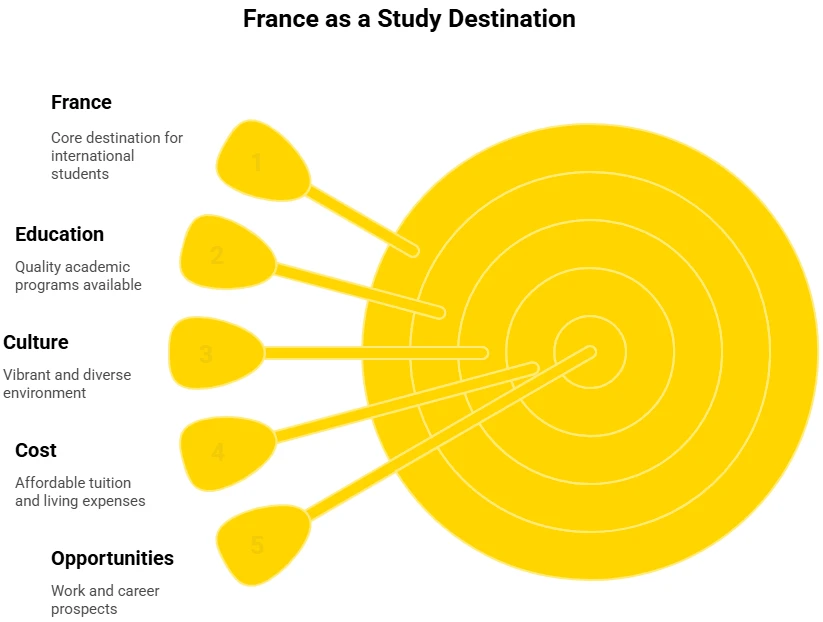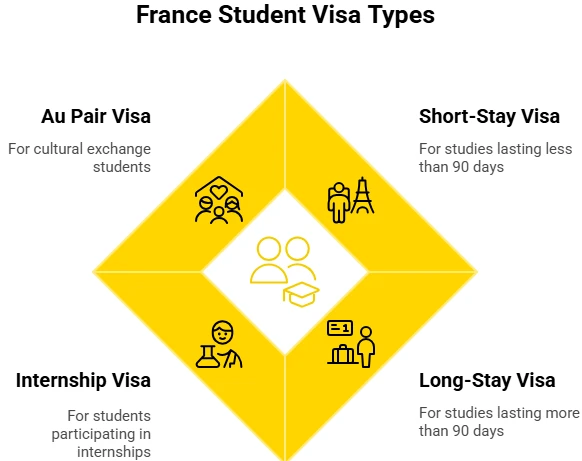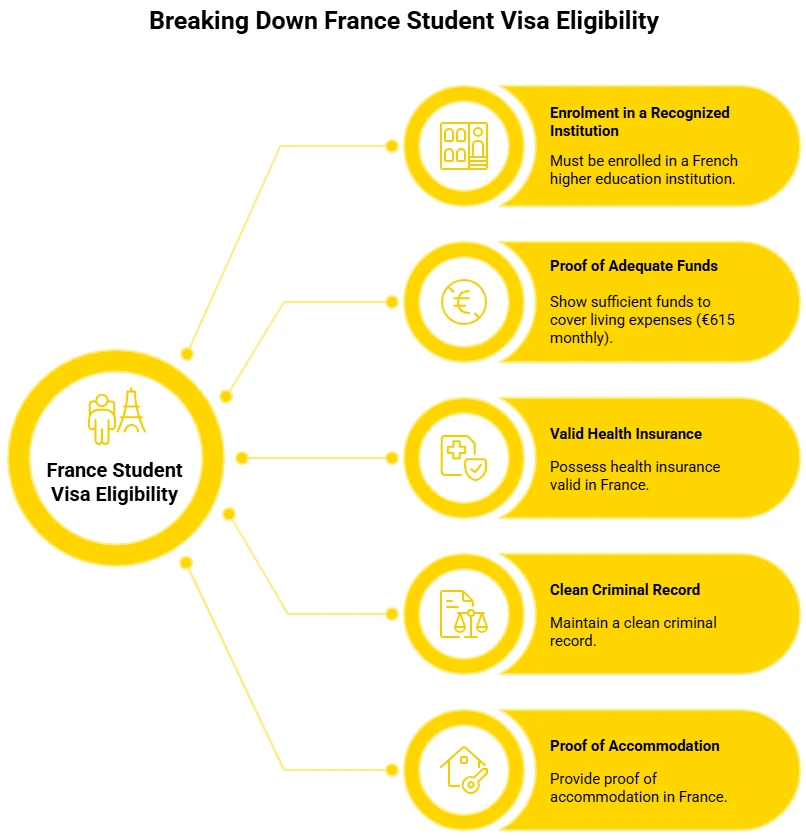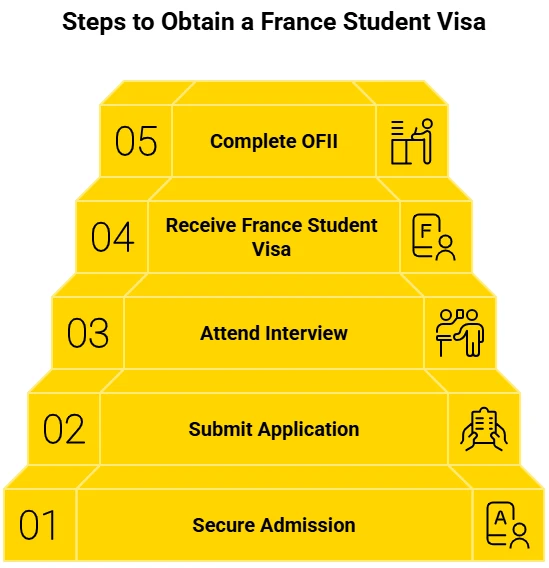Study in France
Don't know what to do?
Get Free Counselling
Study in France – Everything You Need to Know
France is a common choice for Canadian students who want a good education, lively culture, and lower school costs. With over 1,600 programs taught in English and chances to work after school, France mixes learning and job prospects well.
- France hosted 412,000 international students in 2024, which is 3% more than in 2023 (Campus France).
- International students account for 1 in 10 students in France, adding to its diversity.
- Public university tuition starts at €2,770 per year for undergraduates (2025 prices).
- Students can work up to 20 hours a week if they have the correct student visa.
- Canada is one of the top 15 countries that sends students to France each year.

*Want guidance to apply for a French Student Visa? Sign up with Y-Axis for comprehensive support with the process.
What is a France Student Visa?
The France Student Visa, known as a long-stay visa (VLS-TS), lets international students, including Canadians, reside and study in France for programs lasting over 90 days. It also functions as a residence permit, granting students the ability to work up to 20 hours each week while studying. To apply, acceptance into a recognized French institution and registration via Campus France are needed. This visa is important for gaining access to things such as healthcare, housing, and other student resources during studies in France.
Why Study in France?
Here are a few reasons why France could be your ideal study abroad destination.
- Enrollment in highly esteemed universities and Grandes Écoles.
- Tuition costs are inexpensive through French government aid.
- Programs taught in English are available for students.
- The Schengen travel rights offer simple access to Europe.
- A dynamic lifestyle is supported by its culture, art, and food.
Benefits of Studying in France
The benefits of studying in France are given below.
- Inexpensive tuition fees
- Students can find job openings both during school and after they graduate.
- International students may be able to get scholarships and grants.
- Graduates may have options for staying long-term or getting work permits.
- Students get big discounts on things like travel, places to live, and cultural events.
Types of France Student Visas
France provides various student visas that depend on the length and purpose of study. Some of the popular France student visas are:
- Short-Stay Student Visa (less than 90 days)
- Long-Stay Student Visa (VLS-TS)
- Internship Visa (Stage)
- Au Pair Visa (for cultural exchange students)

Short-Stay Student Visa (less than 90 days)
For international students intending to study in France for stays shorter than 90 days, the France Short-Stay Student Visa is an option. This visa suits short courses, language programs, summer schools, or cultural exchange programs. Note that this visa can’t be extended or changed to a long-stay visa, and it doesn’t allow part-time jobs. Those applying need to give confirmation of enrollment, proof of funds, and where they plan to stay while in France.
Long-Stay Student Visa (VLS-TS)
The France Long-Stay Student Visa (VLS-TS) serves students from abroad intending to study in France for more than 90 days. Functioning as both a visa and a temporary residence permit, it lets students reside in France for their study period. This visa permits students to work up to 20 hours weekly and access French healthcare and student aid. Application requires admission to a French school and registration via Campus France before visa submission.
Internship Visa (Stage)
The France Internship Visa lets foreign students do internships or practical training in France as part of their studies. With this visa, you can stay in France for your internship. The internship needs a formal agreement (convention de stage) signed by your school, the French company, and you. It usually covers internships up to 6 months and might allow some work if the agreement states so.
Au Pair Visa (for cultural exchange students)
The France Au Pair Visa enables international students, including Canadians, to join a cultural exchange by living with a French host family while studying. With this visa, individuals can attend French language courses and act as an au pair, aiding in childcare and simple household chores. In return, they receive room, board, and a small allowance. Generally, the visa lasts up to a year and needs an au pair placement deal approved by French officials. Candidates should be between 18 and 30 years of age and provide proof of money and health coverage.
Eligibility Criteria for a France Student Visa
The eligibility criteria for a France Student Visa are given below.
- Enrolment in a recognized French higher education institution.
- Proof of adequate funds to cover living costs (at least €615 monthly).
- Have health insurance that is valid in France.
- Have a clean criminal record
- Proof of accommodation in France

Documents and Requirements for a France Student Visa
Required documents for a French student visa include:
- A valid passport and a filled-out visa application.
- An acceptance letter from a French institution or approval from Campus France.
- Evidence of funds (bank statements, sponsorship documentation).
- Proof of medical coverage and where the student will be living.
Step-by-Step Process to Apply for a France Student Visa
The process to apply for a France Student Visa is given below.
Step 1: Secure admission to a French university and register with Campus France.
Step 2: Organize the required documents and send your student visa application to the French consulate in Canada.
Step 3: Attend the visa interview and give your biometric info.
Step 4: Receive your student visa and go to France.
Step 5: Complete the residence permit approval (OFII) within 3 months after you arrive.

Cost of Studying in France
Detailed information about the costs of studying in France is given below.
| Type of Expense | Cost (EUR) | Cost (CAD Approx.) |
| Public university tuition | €2,770–€3,770 per year | CAD 4,000–5,500 per year |
| Private university tuition | €5,000–€20,000 per year | CAD 7,300–29,500 per year |
| Living expenses | €700–€1,000 per month | CAD 1,000–1,500 per month |
| Health insurance | €300–€500 per year | CAD 450–750 per year |
France Student Visa Fees
Detailed information about the fees for a France student visa depending on their type is given below.
| Visa Type | Fee (EUR) | Fee (CAD Approx.) |
| Short-Stay Student Visa (less than 90 days) | € 80 | CAD 115 |
| Long-Stay Student Visa (VLS-TS) | € 99 | CAD 140 |
| Internship Visa (Stage) | € 99 | CAD 140 |
| Au Pair Visa (for cultural exchange students) | € 99 | CAD 140 |
France Student Visa Processing Time
Detailed information about the processing times for the different types of French study visa is given below.
| Visa Type | Processing Time |
| Short-Stay Student Visa (less than 90 days) | 7–15 business days |
| Long-Stay Student Visa (VLS-TS) | 2–4 weeks (after Campus France approval) |
| Internship Visa (Stage) | 2–4 weeks |
| Au Pair Visa (for cultural exchange students) | 2–4 weeks |
Renewal and Extension of France Student Visas
To prolong your stay for academic pursuits in France, you may need to renew your student visa. It is advised to start the application process at the local prefecture at least two months before your current visa runs out.
To be eligible for renewal, you will need:
- Evidence that you are still enrolled in a French school.
- Records of your grades or a reason why you have not finished your studies on time.
- Proof that you have enough money to live on (at least €615 each month).
- Up-to-date health insurance and confirmation of your living arrangements.
After you graduate, you could apply for a temporary permit that lets you stay for one year while you search for work or create a company. If you get a job, you can switch to a work visa.
Challenges and Tips for a Successful Application
The possible challenges and tips for a successful France student visa application is given below.
| Challenge | Tip for Success |
| Proving sufficient financial means | Maintain a clear bank statement or secure a sponsorship letter. |
| Missing Campus France registration | Start the process early and follow Campus France procedures. |
| Tight visa processing timelines | Apply at least 2–3 months before your intended start date. |
How Can Y-Axis Help You?
Y-Axis is a leading overseas education and immigration consultancy that supports students pursue education in France. We assist with university selection and visa acquisition to ensure a straightforward and successful international education experience.
Our services consist of:
- Individual profile reviews and university options.
- Scholarship searches and financial planning advice.
- Complete paperwork support and help with French student visa applications.
- Orientation before leaving and direction for finding housing.
- Support after you arrive to help you adjust to living in France.
Frequently Asked Questions
